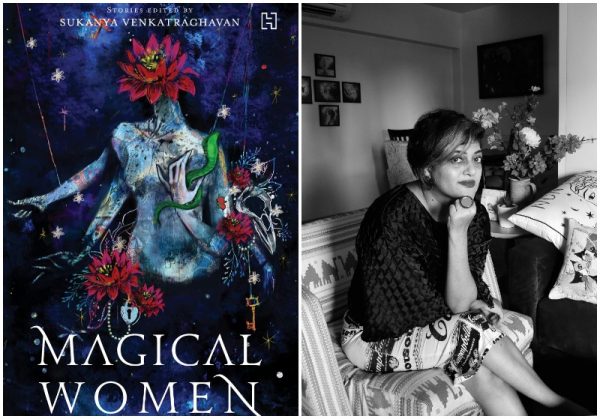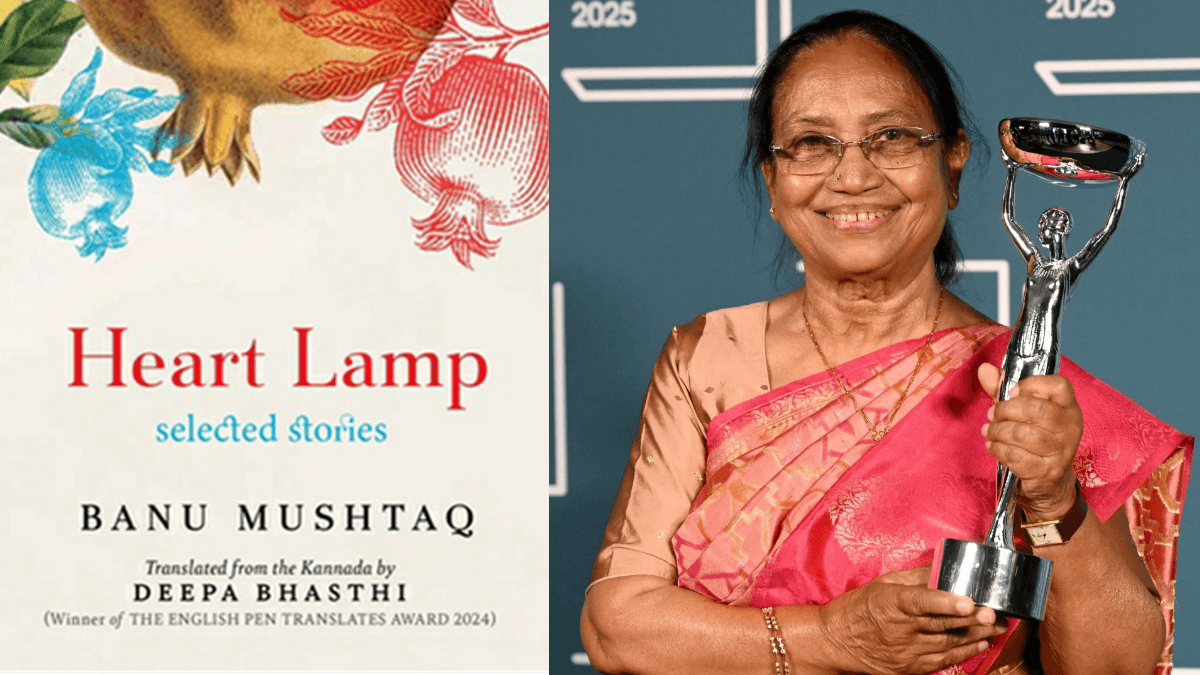Trigger Warning: This article contains mentions of rape and child sexual abuse.
I, for one, do not like to read anthologies. It’s always the anthologies – fiction or otherwise, that don’t get any love from me at book fairs, online book sales, and flash sales at bookstores alike. Don’t get me wrong – there’s nothing wrong with anthologies. If done right, they can be incredibly powerful. But if not, they can make even the best work seem mediocre, make an entire collection look like it was hastily put together at the last minute. Another thing I always fear is that I’ll be lost in-between the many different forms every individual contribution in the collection can take. I fear not being able to follow the progression from one story to the next – just the idea of that is enough to put me off anthologies.
Enter Magical Women – a one-of-its-kind, probably India’s first fantasy and sci-fi anthology, which features the works of women and non-binary writers. Published by Hachette India in 2019, the anthology brings together 14 stories by well known contemporary Indian women writers, each drawing from the women that already exist in our Indian mythology and folklore, but also adding their own eccentric touch to it. Edited by Sukanya Venkatraghavan, the anthology puts together stories of women who are, well, magical, but also so much more. Venkatraghavan, who has previously written her own fantasy novel called Dark Things, has managed to assemble a unique set of stories featuring vegan chudails, athleisure wearing goddesses, yakshis trapped in a dystopia, rakshasnis who garden, and many other eccentric ‘magical women’ – who, despite their mystique and allure, often fall flat or fail to captivate.
The book opens with Shreya Ila Anasuya’s ‘Gul‘- which is a story about a courtesan living in the 1850s Lucknow falling in love with a fellow courtesan ‘Gulbadan’, who is equal parts magic and mystery. While ‘Gul’ might not be my favourite, it certainly is the most beautiful story out of all the 14 that I read. Anasuya’s ‘Gul‘ is charming, and stays with you even after you are done reading the book. I wonder if my strong aversion to anthologies would have acted up had ‘Gul‘ not been the first story in the anthology. But it was, and I was hooked, so I kept reading. The next two stories – ‘Gandaberunda‘ by S.V. Sujatha and ‘Rulebook for Creating a Universe‘ by Tashan Mehta are enjoyable, and while they aren’t poorly written, they also don’t stand out. While Samhita Arni’s ‘The Demon Hunter’s Dilemma‘ seems like a good attempt at reinventing the idea of what we see as demonic, its naive protagonist is too much like the now cliche YA fantasy female lead – strong and beautiful (but obviously too oblivious to notice the latter). After a certain pisacha that she captures and is supposed to take back to her Guru’s ashram calls her ‘a pretty girl’, is it even a surprise that this happens? “As she collected the water from a nearby pond to turn the powdered herb into a paste, she stopped, catching sight of her reflection in the dark water. Long hair, eyes that seemed too big for her face. Lips that she had always thought too plump. A nose that she had wished was less sharp. Yet, the pisacha had called her beautiful.” Sigh.
Also Read: No More Tokenism – Why We Need More Diverse Fiction
The stories that I particularly liked were Sejal Mehta’s ‘Earth and Evolution Walk into a Bar…’, Trisha Das’ ‘Tridevi Turbulence’, Shweta Taneja’s ‘Grandma Garam’s Kitty Party’, and Nikita Deshpande’s ‘The Girl Who Haunted Death’. All four stories have such extraordinary characters that you’ll be laughing, cheering, nodding your head sharply in agreement, sighing or will just be plain happy about the fact that you read these stories. Das’ ‘Tridevi Turbulence’ especially stands out – it’s hilarious! But it could have done away with the subtle-not-so-subtle fat-shaming bit and the not-so-subtly-unsubtle message at the end – it comes off as a bit preachy, a little too much on the face. Deshpande’s story though is a unique take on the myth of Savitri and Satyavan, and its execution is brilliantly carried out through strong characterisation. I was instantly charmed by her riveting, genderfluid, and well-rounded personification of Death. What seems to be consistent throughout the four stories though, is the fact that they have fun and experiment with existing myths in a way that has not been done before, which makes reading them a rewarding experience.
I also liked ‘Stone Cold’ by Kiran Manral, ‘The Carnival at the Edge of the Worlds’ by Shveta Thakrar, and the ‘The Rakshasi’s Rose Garden’ written by Sukanya Venkatraghavan herself. Venkatraghavan’s contribution to the anthology caught my eye for its intriguing depiction of a woman’s rage, which is a recurring theme throughout the book, but portrayed exceptionally well in this piece specifically. On the other hand, Manral’s dystopia could have been more interesting, a little bit different from the typical dystopian universes that are now quite commonly seen in works of science-fiction, and the worlds in ‘The Carnival at the Edge of the Worlds’ a little less complicated, making it easier for the reader to follow the story.
Since we’re talking about being comprehensible – Ruchika Roy’s ‘The Gatekeeper’s Intern’ is especially confusing. Though Roy’s world-building should be commended, the plot could have been fleshed out and turned into an entire novel. It had an excessive number of elements which could not fit seamlessly in the limited space that an anthology offers. Same is the problem with Asma Kazi’s ‘Bahameen‘- its time-jumping protagonist is fascinating, but the plot swings from one thing to another so swiftly that it is quite hard to focus on one thing; and while I jumped at the prospect of time jumping, ‘Bahameen‘ left me strangely underwhelmed. And so did Krishna Udayashankar’s ‘Apocalyptica‘- the premise excited me, but there were too many loose ends and too many questions left unanswered.
But it was ‘Apocalyptica‘, very aptly placed at the end, that made me notice a certain something about ‘Magical Women‘- the recurring theme of rape and sexual abuse, especially child sexual abuse. Not even my favourites were safe. This is not something that’s uncommon for fantasies. If you’re a woman in a fantasy novel, your character arc is incomplete without you being sexually assaulted in some way or another. Look no further than the beloved ‘A Song of Ice and Fire Series’ by George R.R. Martin, which also inspired the hugely popular and successful HBO series ‘A Game of Thrones’ – sexual assault towards women in Martin’s story is quite common. It’s even become a common trope in fantasy fiction. Some stories in ‘Magical Women‘ too, take this route to justify a plot point or move the story forward – and while a lot of fantasy fiction lovers come at me holding their ‘for the sake of realism’ placards in their hands, I just can’t get behind this trope. If fantasy fiction can have huge fire breathing dragons and vegan chudails who want corporate jobs, so can they have their women not be subjected to sexual assault in some form or another. Sure, sexism is a problem, and so is gender-based violence, but I would really like it if we could factor that in some other way into the story.
Also Read: Women In The Game Of Thrones – How Far Have They Come?
Overall, ‘Magical Women‘ is, like I said before, an ambitious project. Putting together an anthology like this is not an easy feat, so I cannot help but laud Venkatraghavan’s superb editing skills. This collection of stories could have been so much more, but considering the fact that it is the first attempt to commission a book like this, I’m thankful that ‘Magical Women‘ exists. It will hopefully pave the way for many more Indian women fantasy fiction writers, and might even encourage Indian women to dabble into the world of fantasy fiction and lead to them coming up with their own stories. For that reason alone, I would recommend giving ‘Magical Women‘ and its known but yet unprecedented characters a read. Happy reading!
You can buy ‘Magical Women‘ at your nearest bookstore or online.
Featured Image Source: She The People
About the author(s)
Purnima is a wannabe writer and a want-to-be cat mom.




